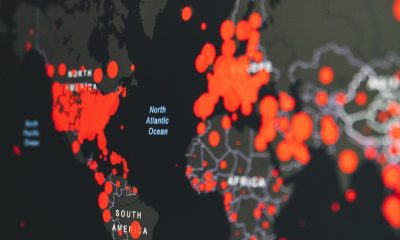Arctic river channels migrating slower due to warming climate: study
Scientists analyzed a collection of time-lapsed satellite images of the past 50 years.
Published
1 year ago onBy
Talker News
By James Gamble via SWNS
Arctic rivers are moving and changing at a slower pace than expected due to climate change, suggests a new study.
Scientists believed that, like most other rivers in the world, warming climates would cause the ways in which Arctic river banks change and are eroded to accelerate.
However, a new study from the University of British Colombia in Canada suggests warming climates over the past half a century have caused rivers in the Arctic to 'migrate' at a slower pace.
The researchers believe the "greening up" of the rivers' banks may have led to the slowing of sideways migration of around 20 percent over the past half a century.
The study team added that understanding these rivers' responses to changes in the environment is 'paramount' to assessing the impacts of climate change on the Arctic.
Migration refers to the natural process of how a river channel moves over time.
The process can occur gradually, such as when a stream erodes away one bank and deposits sediment along the opposite side or quickly during floods and high waters.
The UBC team sought to test the hypothesis that our warming climate leads to faster channel migration in Arctic rivers.
To do this, they analyzed a collection of time-lapsed satellite images of the past 50 years.
They compared more than 1,000 kilometers of riverbanks from ten Arctic rivers in Alaska, the Canadian Yukon and Northwest Territories, including major watercourses such as the Mackenzie, Porcupine, Slave, Stewart and Yukon rivers.
They had expected to find that the meandering waterways in permafrost terrain - terrain which has been frozen for two or more years - were moving faster due to the warming climate.
As part of their research, the scientists also analyzed data from rivers in non-permafrost regions of warmer climates in the Americas, Africa and Oceania.
They found that these rivers tend to migrate at faster rates in their warming climates, which is more consistent with previous studies.
But in Arctic rivers, the researchers were surprised to find that the opposite was true.
The time-lapse analysis showed migration of large Arctic rivers has decreased by around 20 percent over the past 50 years - and the study's authors claim this could even be a "conservative measure."
Dr. Alessandro Ielpi, the lead author of the study, explained that the assumption of faster channel migration across all rivers due to climate change had dominated the scientific community for years.
Dr. Ielpi, also an Assistant Professor with UBC Okanagan’s Irving K. Barber Faculty of Science, said: "The western Arctic is one of the areas in the world experiencing the sharpest atmospheric warming due to climate change.
“Many northern scientists predicted the rivers would be destabilized by atmospheric warming.
"The understanding was that as permafrost thaws, riverbanks are weakened, and therefore northern rivers are less stable and expected to shift their channel positions at a faster pace.
"But the assumption had never been verified against field observations.
"We tested the hypothesis that large sinuous rivers in permafrost terrain are moving faster under a warming climate and we found exactly the opposite.
“We found that large sinuous rivers with various degrees of permafrost distribution in their floodplains and catchments display instead a peculiar range in migration rates.
"Surprisingly, these rivers migrate at slower rates under warming temperatures."
Dr. Ielpi added that an increase in vegetation has helped to stabilize the riverbanks.
He said: “Yes, permafrost is degrading, but the influence of other environmental changes, such as the greening of the Arctic, counteracts its effects.
"Higher temperatures and more moisture in the Arctic mean the region is greening up.
"Shrubs are expanding, growing thicker and taller on areas that were previously only sparsely vegetated.
"The dynamics of these rivers reflect the extent and impact of global climate change on sediment erosion and deposition in Arctic watersheds.
“Understanding the behavior of these rivers in response to environmental changes is paramount to understanding and working with the impact of climate warming on Arctic regions."
Dr. Ielpi highlighted that monitoring the erosion of riverbanks and channel migration around the world is an important tool for better understanding the effects of climate change.
“The migration deceleration of about 20 percent of the documented Arctic watercourses in the last half century is an important continent-scale signal.
"And our methodology tells us that 20 percent may very well be a conservative measure.
"We’re confident it can be linked to processes such as shrubification and permafrost thaw, which are in turn related to atmospheric warming.
"Scientific thinking often evolves through incremental discoveries, although great value lies in disruptive ideas that force us to look at an old problem with new eyes.
“We sincerely hope our study will encourage landscape and climate scientists elsewhere to re-evaluate other core assumptions that, upon testing, may reveal fascinating and exciting facets of our ever-changing planet."
The study was published in the scientific journal Nature Climate Change.
Stories and infographics by ‘Talker Research’ are available to download & ready to use. Stories and videos by ‘Talker News’ are managed by SWNS. To license content for editorial or commercial use and to see the full scope of SWNS content, please email [email protected] or submit an inquiry via our contact form.
You may like


Scientists estimate as much as 11M tons of plastic sitting on ocean floor


Scientists say this disease most likely to cause next global pandemic


Study finds longest recorded COVID infection lasted nearly two years


Scientists create family tree of coffee for clues to resist climate change


Tiny ingestible beads could help fight liver disease: study


Regular exercise can greatly reduce risk of cardiovascular disease: study
Other Stories


Pro mermaid’s career goes swimmingly after overcoming ocean fear
She makes up to $8,000 a show.


Giant prehistoric salmon used tusk-like teeth to fight off predators
The species that grew up to nine feet long lived in the North American Pacific Northwest.


Evidence of Earth’s magnetic field dates back 3.7 billion years
Life on Earth would not be possible without its magnetic field.


Adorable video shows baby rhino enjoying sunshine
By Faye Mayern via SWNS An endangered baby rhino has well and truly found its feet after being filmed playing...


Hilarious moment delivery man gets chased by tiny dog
The hilarious encounter was caught on video.
Top Talkers

 Parenting7 days ago
Parenting7 days agoSingle mom details struggles of feeding her 12 kids

 Lifestyle5 days ago
Lifestyle5 days agoWoman regrets her tattoo nightmare: ‘It’s horrendous’

 Good News2 days ago
Good News2 days agoDisabled student takes first steps in 10 years on graduation stage

 Broadcast1 week ago
Broadcast1 week agoOver 40% of Americans have no clue what a 401k is

 Health2 days ago
Health2 days agoNew study reveals ‘old age’ begins later than it used to

 Broadcast1 week ago
Broadcast1 week agoHow hard is it for Americans to live sustainably?

 Money1 week ago
Money1 week agoOver 40% of Americans have no clue what a 401k is

 Wildlife1 day ago
Wildlife1 day agoClever elephant returns visitor’s shoe after falling into enclosure
